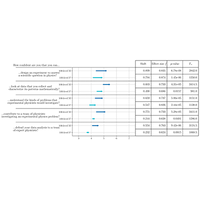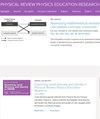在虚拟现实实验室中模拟新颖的物理学:学生学习的情感分析
IF 2.6
2区 教育学
Q1 EDUCATION & EDUCATIONAL RESEARCH
Physical Review Physics Education Research
Pub Date : 2024-05-28
DOI:10.1103/physrevphyseducres.20.010146
引用次数: 0
摘要
[本文是 "教学实验重点文集 "的一部分:改进传统和新方向]。我们报告了一项关于在虚拟现实环境中模拟虚构物理定律的实验活动对以下方面影响的研究:(i) 学生对物理实验在课堂和世界中作用的认识论;(ii) 学生的自我效能感;以及 (iii) 学生参与实验活动的质量。我们通过在虚拟现实(VR)中模拟真实和虚构的物理现象,为学生创造物理实践的机会,将其作为创造和验证新知识的一种手段。这种方法通过消除任何形式的先前或外部模型来确认,从而引导学生在实验中摆脱确认思维。我们将使用这种方法的活动称为 "混合现实中的新观察"(NOMR)实验室。我们考察了 NOMR 在 100 级和 200 级本科课程中的效果。通过前后测量,我们发现在 NOMR 实验后,这两个群体的学生在实验物理的认识论方面更像专家,并对自己做实验物理学家所做的事情的能力有了更强的自我效能感。通过 "流动 "心理学理论的视角,我们发现学生参与 NOMR 实验与参与传统动手实验一样富有成效。在课堂上使用虚拟现实技术的新奇感消失后,这种参与感依然存在,这表明这些效果是由教学设计而非干预媒介造成的。我们的结论是,这些 NOMR 实验为物理实验教学提供了一种方法,它以培养学生对真实科学实践的理解和舒适感为中心。本文章由计算机程序翻译,如有差异,请以英文原文为准。

Modeling novel physics in virtual reality labs: An affective analysis of student learning
[This paper is part of the Focused Collection on Instructional labs: Improving traditions and new directions.] We report on a study of the effects of laboratory activities that model fictitious laws of physics in a virtual reality environment on (i) students’ epistemology about the role of experimental physics in class and in the world; (ii) students’ self-efficacy; and (iii) the quality of student engagement with the lab activities. We create opportunities for students to practice physics as a means of creating and validating new knowledge by simulating real and fictitious physics in virtual reality (VR). This approach seeks to steer students away from a confirmation mindset in labs by eliminating any form of prior or outside models to confirm. We refer to the activities using this approach as Novel Observations in Mixed Reality (NOMR) labs. We examined NOMR’s effects in 100-level and 200-level undergraduate courses. Using pre-post measurements, we find that after NOMR labs, students in both populations were more expertlike in their epistemology about experimental physics and held stronger self-efficacy about their abilities to do the kinds of things experimental physicists do. Through the lens of the psychological theory of flow, we found that students engage as productively with NOMR labs as with traditional hands-on labs. This engagement persisted after the novelty of VR in the classroom wore off, suggesting that these effects were due to the pedagogical design rather than the medium of the intervention. We conclude that these NOMR labs offer an approach to physics laboratory instruction that centers the development of students’ understanding of and comfort with the authentic practice of science.
求助全文
通过发布文献求助,成功后即可免费获取论文全文。
去求助
来源期刊

Physical Review Physics Education Research
Social Sciences-Education
CiteScore
5.70
自引率
41.90%
发文量
84
审稿时长
32 weeks
期刊介绍:
PRPER covers all educational levels, from elementary through graduate education. All topics in experimental and theoretical physics education research are accepted, including, but not limited to:
Educational policy
Instructional strategies, and materials development
Research methodology
Epistemology, attitudes, and beliefs
Learning environment
Scientific reasoning and problem solving
Diversity and inclusion
Learning theory
Student participation
Faculty and teacher professional development
 求助内容:
求助内容: 应助结果提醒方式:
应助结果提醒方式:


